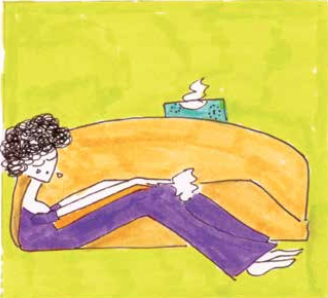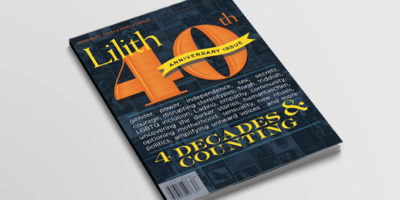
from “Analyze THIS”
Therapy: Why are Jewish women so heavily represented on both sides of the tissue box? [Winter 2012-2013]

Art: Ilene Beckerman
Not long ago at a packed synagogue service, the rabbi happened to ask the congregation, “How many of you are psychotherapists?” A stunning number of hands shot up and the congregation burst into laughter. “How many of you are in therapy?” he then joked, since the spirit had suddenly become intimate. Even more hands, followed by so much laughter it rattled the yizkor plaques.
It wasn’t that any of us were surprised by this—after all, the lobby directories in the synagogue’s urban neighborhood are virtual decalogues of Weinberg and Goldman and Rifkin psychotherapy practices—it was more like something had been broached that none of us had exactly thought through; like an emotionally complex secret had been outed that felt sweet or canny or embarrassing or maybe hilarious. We didn’t know. Most of the hands belonged to women.
Sometime after that, I attended the Psychotherapy Networker Symposium in Washington, D.C., an annual conference of 3000-plus people that is 80% female and overwhelmingly Jewish. By the look of the crowds muscling through the hotel hallways, it could have passed for a Hadassah convention. It got me wondering: Why are Jewish women so over-represented as shrinks? And why are so many of us also among the shrunken?
It’s true that as the psychotherapy profession has increasingly yielded to less intellectually rewarding orientations and as the field has become less lucrative by the day, fewer Jewish women are choosing to enter it. But it’s also true that if you’re reading this, you’re either a therapist, or someone who’s been to one, or one degree of separation from same. So I decided to interview several dozen women, mostly practitioners (plus some clients/patients), to ask whether and how they thought that being Jewish and female informed their work in the therapy room.
Do you think Jewish women are particularly good at rupture and repair? I asked. Do you feel you’ve inherited the long Jewish tradition of pilpul [dialectical thinking], of learning in pairs, of sitting with multiple truths, of tolerating doubt, of skepticism, of pre-occupation with redemption? Of jokes about reasoning, of memory as the most moving category of experience?
Is Freud a secular Rashi? Do women or Jews seem attuned to “yearning” in an acoustically special way? Does the timbre or range of your emotions, or your dutiful witnessing, feel Jewish or womanly? Do you carry transgenerational rachmones or trauma? As a Jewish woman, do you have a culturally specific ear for bullshit and for calling it out? Did you need to be a healer?
As someone who herself became a rabbi and then a clinical psychologist, I’m aware of having been deeply affected by the Mishnaic cornerstones of my day school education: “Acquire a friend with whom to study,” “Everything is foreseen yet freedom of choice is given,” and “hafach ba v’hafach ba” —“Turn it and turn it [a sacred text] for everything is in it.”
Does talking about Jewish stuff in therapy stir people up? Yes, my informants said, which is why we so often don’t do it. Are the dynamics different, I asked, when your patient (or therapist) is Jewish or female? Often, yes. Do you cherish the work you do? Every single psychotherapist said yes to that.


